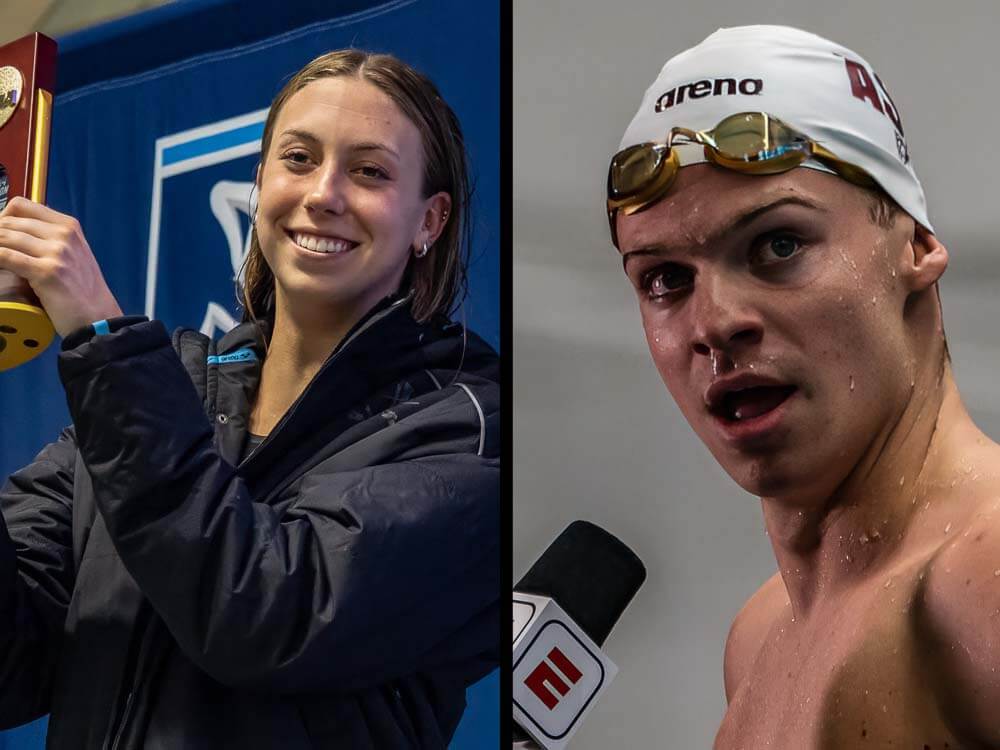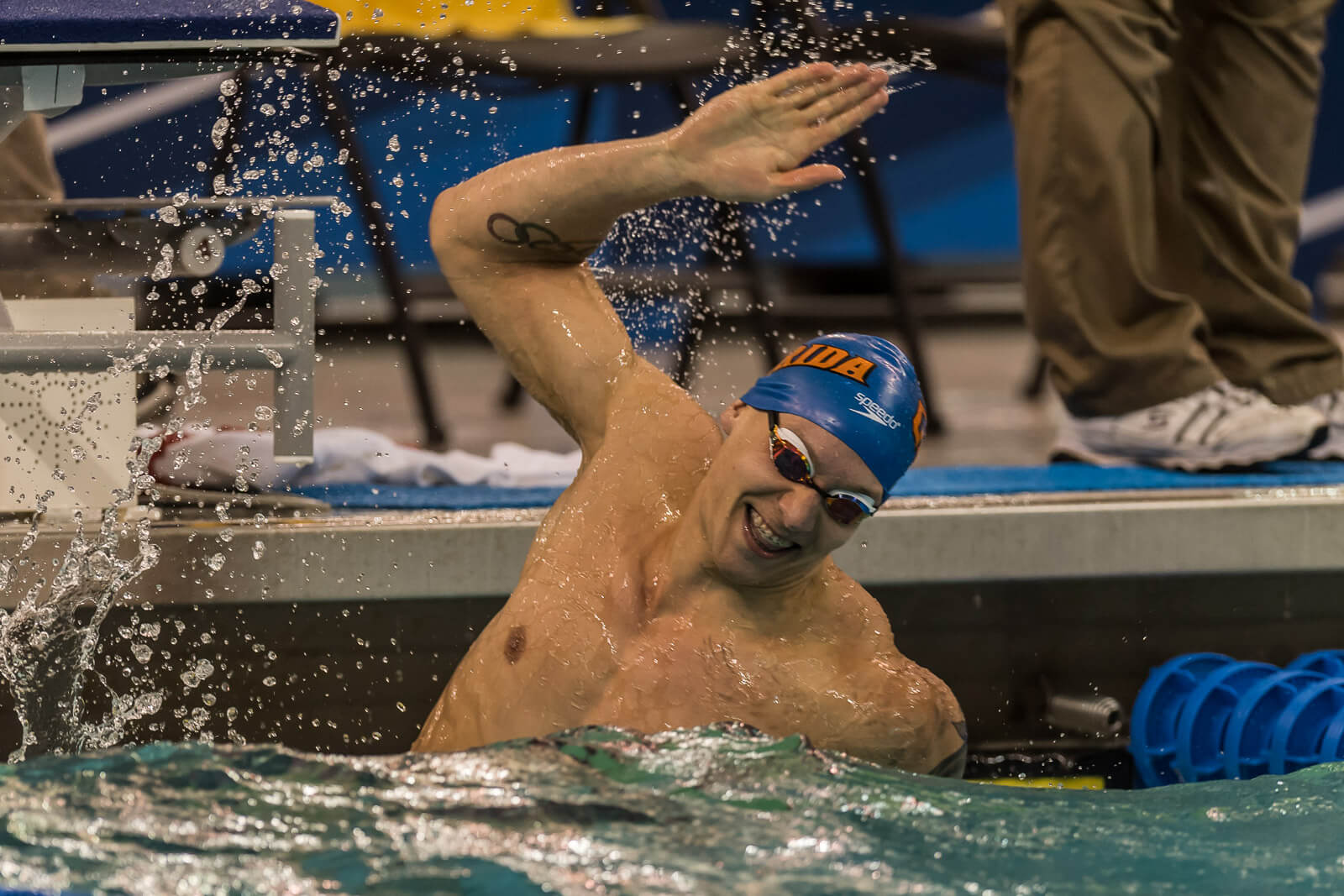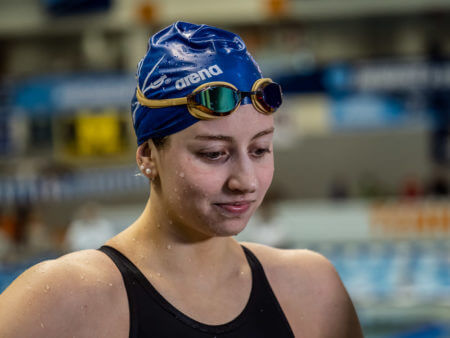Dressel, Douglass, Marchand, Walsh: Comparing Transcendent Performances at NCAA Championships

Dressel, Douglass, Marchand, Walsh: Comparing Transcendent Performances at NCAA Championships
When Caeleb Dressel concluded his collegiate swimming career in 2018, his accomplishments seemed unlikely to be matched anytime in the near future.
After all, Dressel’s last NCAA Championships saw him become the first man under 18 in the 50 freestyle, first under 43 in the 100 butterfly and first under 40 in the 100 freestyle. Earlier in the season, he had already posted the fastest times ever in the 200 IM and 100 breaststroke, and at NCAAs, he led a team full of non-sprinters to a national title in the 200 free relay.
When the meet was over, everyone at Jean K. Freeman Aquatic Center in Minneapolis knew they had just witnessed one of the greatest individual performances in college swimming history.

Caeleb Dressel at the 2018 NCAA Men’s Championships — Photo Courtesy: Peter H. Bick
But over the past two seasons, swim fans have been treated to the same type of awe-inspiring performances at both the women’s national championships and the men’s. Just like Dressel thrice obliterated individual records while carrying his teams with historic performances in relay after relay, Leon Marchand has twice accomplished the feat for Arizona State University while Kate Douglass and Gretchen Walsh have each taken a turn in the starring role for the University of Virginia.
The argument for Marchand matching or even exceeding Dressel originated last season, with the Frenchman obliterating the fastest times ever in the 200 IM, 400 IM and 200 breaststroke, taking the events to never-before-seen heights just like Dressel did. Where Marchand had a leg up was in the relay events, as he sped to the fastest breaststroke splits ever in the 200 medley relay and 400 medley relay plus the quickest 200 free split ever as part of ASU’s 800 free relay. His 400 free relay split came in second-quickest in the field.
We said last March that Marchand’s records could survive a generation, just like Dressel’s marks have, unless Marchand would break all three again in 2024. As it turns out, Marchand would opt out of the 200 IM altogether this season, and he swam more than three seconds slower in winning another national title in the 400 IM. But that slowdown was no accident — Marchand was conserving energy for Arizona State’s attempt to win its first-ever NCAA relay title in the 400 medley later that night — and Marchand would still set the fastest time ever in three events at the meet.
Leading off ASU’s 800 free relay, he became the first man ever under 1:29 in the 200 free. Switching his focus from the 200 IM to the 500 free, Marchand swam the fastest time ever by three seconds, deploying his powerful underwater dolphin kicking to an extent never before seen in the 20-lap race. He lowered his own mark in winning a third consecutive 200 breast title.
ASU ended up winning a pair of relays, with Marchand crushing a 48.73 breaststroke split on the 400 medley relay that beat his own previous fastest mark ever by a half-second and beat 100 breast winner Liam Bell by almost a second. To conclude his meet and punctuate the first-ever national title for Arizona State, Marchand led off the winning 400 free relay in 40.28, making him the third-fastest man ever in the event.
To recap, of the 13 individual events contested at the NCAA Championships, Marchand ranks first all-time in four of them and top-three in two more. And the only reason Marchand has not reached those peaks in the short course 100 breast or 200 fly is a lack of opportunity to do so at a championship meet.
Pretty incredible — but not definitively more impressive in either year than what we witnessed one week earlier at the women’s meet. In 2023, Douglass was at the forefront as she steamrolled national records in the 200 IM, 100 butterfly and 200 breaststroke alongside her central role on four title-winning relays that either set new records or came up just short of times from the conference championships one month earlier.

Kate Douglass at the 2023 NCAA Women’s Championships — Photo Courtesy: Peter H. Bick
Douglass’ case for greatness came from bludgeoning the 200 IM record by almost two seconds, winning a head-to-head showdown with Olympic champion Maggie Mac Neil in the 100 fly and lowering the 200 breast mark for the fourth time in a year. She would have been favored to win the 50 free in 2023, having previously done so in 2021 and 2022, but she dropped that event to focus on the IM. Perhaps her versatility was not quite to the extreme level of Marchand’s, with Douglass more of a sprinter and never attempting any 400 or 500-yard events, but she finished off her final college meet with a strong case for top female collegiate swimmer ever.
At least until one year later, when Walsh continued her ascension for the Cavaliers. Entering the NCAA Championships, she was a virtual lock for a title in any event she would have chosen, with her 100 back and 200 free leadoff times from relays at the ACC Championships quicker than the eventual winning times at the national meet. But Walsh opted for the Dressel treble, the 50 free, 100 fly and 100 free, and her record bonanza was strikingly similar to the Florida Gators legend from six years earlier.
There was no barrier broken in the 50 free, but Walsh won the title in 20.37, a whopping four tenths ahead of the record-setting time from one year before. She became the first woman to go under 48 in the 100 fly with a performance best described as unbelievable, her time of 47.42 a full second ahead of Douglass’ winning effort from the year before. Her 44.83 clocking in the 100 free made her the first woman ever under 45 and put her seven tenths clear of the second-fastest woman in history.
The relays? Once again four wins, and even one NCAA record is mighty impressive considering the Cavaliers saw Douglass depart from the year before. Previously, Virginia swam a new NCAA record in the 200 free relay at the conference meet as Walsh became the first woman ever to record a 19-second relay split.
Get all that? If not, you will get plenty of reminders in future years: the quartet of Dressel, Marchand, Douglass and Walsh accounts for 13 total NCAA records in short course yards, half of all marks between women and men. Of the 10 total relays, NCAA records in six include one or more of those swimmers.
We should acknowledge that all of these performances have overshadowed other brilliance: this year alone, both Alex Walsh (Gretchen’s older sister) and Josh Liendo captured three individual wins apiece at their respective NCAA Championships, and both took part in multiple relay wins. However, thanks to Gretchen Walsh (women’s) and Marchand (men’s), other laudable performances get overshadowed.
So which of these amazing athletes should be considered the finest of NCAA Championships performers within the last decade (and perhaps longer)? That depends upon the standard considered. The versatility component might give the nod to Marchand or Douglass, but Walsh has matched Dressel with winning margins in the sprint events that are unprecedented.
Pick your favorite, but all of these historic performances will be long remembered.




It’s a shame that this event isn’t bringing up Liendo’s achievements as well, as a crappy finish in the 100 fly, and Florida’s battle with ASU in the relays created a meet that was exciting to watch.